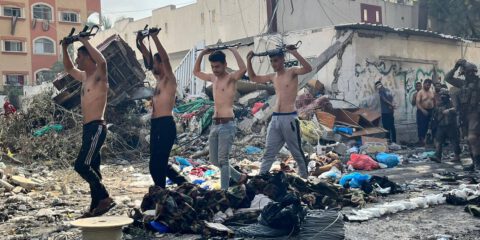Up until October 7, Israel limited its response to Hamas attacks. This policy failed to attain its goals and resulted in a deterrence failure. It must reconsider the notion of a pre-emptive strike that was part of its original security doctrine.
Despite becoming an unrivaled regional power in recent decades, Israel has often opted to contain provocations against it, rather than choosing responses with potential for escalation and for attaining decisive victory. Containment became part of the Israeli national security repertoire. PM Ariel Sharon famously remarked that restraint is an element of strength. Indeed, since Hamas took over Gaza in a bloody coup (June 2007), Israel practiced a policy of containment/restraint punctuated by occasional military responses.
The firing of rockets and mortar shells, the launching of explosive balloons, incendiary kites, and attack drones, and the constant digging of tunnels from the Gaza Strip toward Israel did not elicit an immediate and broad response. Hamas’ repeated attacks drew only a limited and measured reply, intended to contain every incident and bring it to an end as quickly as possible. Over time, Hamas increased the range of its missiles and thus put an ever-greater greater number of Israelis and strategic installations in danger. Israel even chose to contain situations where hundreds of thousands of Israelis were forced to shelter from missile attacks. This can only be interpreted as a deterrence failure.
The separation of Hamas-ruled Gaza from the PA in the West Bank weakened the hostile Palestinian national movement. Israel preferred a weakened Hamas and containment served this purpose. It even approved the transfer of millions of dollars to Hamas from Qatar to prop up the Islamist group’s hold on Gaza. Moreover, Israel continued to supply water and electricity to Gaza and allowed exports of goods as well as imports (under security scrutiny), undermining its quarantine.
In line with its “mowing the grass” strategy, Israel launched several limited ground operations (Cast Lead in December 2008-January 2009, Pillar of Defense in November 2012, Protective Edge on July 17-August 4, 2014). These operations were launched only after extensive rocket fire and harm to civilians and daily life in Israel. The main objectives of these military raids were to debilitate Hamas’ military capabilities and deter it from further attacks against the Israeli population. Yet, neither toppling Hamas’s rule in Gaza nor retaking the entire Gaza Strip was an objective of these missions.
These incursions did not prevent subsequent rearmament and build-up, which necessitates a constant “mowing of the grass.” Yet, Israel failed to attain its goal of keeping Hamas weak. In the aftermath of October 7, the deterrence failure as well as the immense underground infrastructure built under Israel’s eyes is mind-boggling. Israel did not “mow the grass” short enough.
Moreover, the accompanying containment/restraint over time conveys aversion to military confrontation and weakness in a region whose political culture values the use of force. Indeed, the use of force is part and parcel of the rules of the game in the Middle East. The greatest disadvantage of containment is the damage to Israel’s deterrence. After all, fear is the best political currency in the Middle East. Moreover, an erosion of deterrence brings the next round of violence closer.
Fear of casualties, which IDF commanders internalized, thus further leading to restraint, is also perceived by Israel’s opponents as a weakness of Israeli society, further eroding Israel’s deterrence.
In addition, containment/restraint allows the adversary time for force buildup and thus creates a greater future risk to Israel. Over time, Israel allowed Hezbollah to acquire a huge missile arsenal that deterred Israel from acting against it in Lebanon. Hezbollah’s missiles did not “rust,” as former IDF Chief of Staff Yaalon predicted at the turn of the millennium, and they caused enormous damage in the 2006 Second Lebanon War.
Similarly, Israel favored the formula of “quiet for quiet” in Gaza, which, for a time, spared the Israeli population from missile attacks, but gave Hamas time to buttress its regime and build up its force without interference. The Hamas attack on October 7 indicates that, over time, containment and avoiding actions to preserve quiet along the borders leads to much higher costs than taking initiative.
Moreover, the policy of restraint normalizes the use of force by Israel’s adversaries and allows incremental increases in acceptable doses of violence against Israel. Hamas gradually extended the range of its missiles making the life of an increasing number of Israelis miserable.
Over time, containment that may at first seem successful causes complacency and deterrence failures. In Gaza, it produced conditions that led to a strategic surprise.
Containment created frustration among the Israeli public, who expected the IDF to deliver a strong riposte. Israel’s government used the IDF sparingly, causing an uncomfortable feeling that the lives of soldiers are more important than the lives of civilians on the home front. Citizens expect the state to fulfill its social contract with them – to provide security.
In the wake of the events of October 7, it appears that Israel overly relied on containment and that a better balance between the options of the use of force must be re-established.
There is considerable strategic sense to preemptive action, even though this may be a gamble. But so is containment. Israel is paying a heavy price for delaying a strong military response to instill fear among its enemies. Israel cannot dispense with the preemptive strike that was part of its original security doctrine as an alternative that it must seriously consider. Kicking the can down the road is not always prudent.
This article was originally published by The Jerusalem Post
JISS Policy Papers are published through the generosity of the Greg Rosshandler Family.
Photo: IMAGO / ZUMA Wire / Ariel Hermoni / Israel Mod









 - בניית אתרים
- בניית אתרים